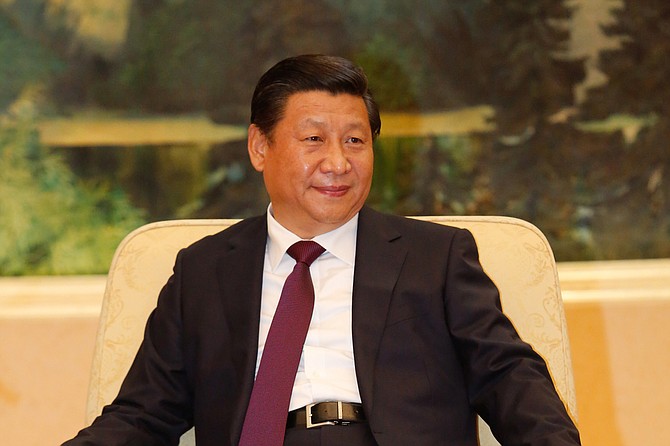President Donald Trump temporarily set aside complaints about market access and currency when he met with Chinese President Xi Jinping (pictured) in April in hopes Beijing would help pressure North Korea to end its nuclear weapons development. Photo courtesy Flickr/Michel Temer
WASHINGTON (AP) — Frustrated over China's inability to pressure North Korea over its nuclear program, the Trump administration is weighing plans to punish China for failing to crack down on intellectual property thefts and forcing U.S. and foreign companies to share their technology in return for access to the vast Chinese market.
That's according to two people familiar with the discussion, who spoke on condition of anonymity because the plans have not been made public.
The administration is considering invoking the rarely used Section 301 of the Trade Act of 1974, which empowers Washington to investigate Chinese trade practices and impose sanctions, including tariffs, within months, according to one of those people.
The investigation would focus on China's alleged forced technology transfer policies and practices, one of the people said, adding that the Trump administration could move to launch such a probe this week. The second person cautioned that no decisions or timelines had been finalized yet.
U.S. and other Western governments and business groups accuse Beijing of unfairly nurturing Chinese competitors — in fields ranging from medical equipment to renewable energy to electric cars — by requiring foreign firms to hand over proprietary technologies in exchange for being allowed to operate in China.
American companies have long complained that Chinese competitors steal their technology and use it to compete against them. Being forced to hand over technology to gain access to the Chinese market adds to the risk.
China's Ministry of Commerce did not immediately respond to a faxed request for comment.
These deliberations come as the administration has signaled a harsher stance on trade than it took in the first six months of Trump's presidency when it comes to China.
President Donald Trump temporarily set aside complaints about market access and currency when he met with Chinese President Xi Jinping in April in hopes Beijing would help pressure North Korea to end its nuclear weapons development. But tensions bubbled up last month at a U.S.-Chinese dialogue where U.S. Treasury Secretary Steve Mnuchin blamed China's $347 billion trade surplus with the United States last year on "government intervention in its economy."
Trump has also grown increasingly frustrated by what he says is China's reluctance to rein in North Korea.
"I am very disappointed in China. Our foolish past leaders have allowed them to make hundreds of billions of dollars a year in trade," he tweeted recently, "yet... they do NOTHING for us with North Korea, just talk."
"We will no longer allow this to continue," he added. "China could easily solve this problem!"
The Wall Street Journal and New York Times also reported that U.S. trade officials are discussing ways to counter piracy of copyrights and patents and other intellectual property in China.
U.S. Commerce Secretary Wilbur Ross, in a commentary in Tuesday's Wall Street Journal, outlined a slew of grievances against both China and the European Union that he said contributed to the global U.S. trade deficit in goods of $725.5 billion in 2016.
"Both China and Europe also bankroll their exports through grants, low-cost loans, energy subsidies, special value-added tax refunds and below-market real estate sales, among other means," Ross wrote.
The Wall Street Journal and New York Times stories also said U.S. officials were looking into using Section 301 of the 1974 Trade Act. Another possibility would be to invoke the "International Emergency Economic Powers Act," a law also enacted during the 1970s that gives the president wide powers to take action after declaring a national emergency, the Wall Street Journal report said.
The president has long railed against Chinese trade practices.
"Predatory trade practices, product dumping, currency manipulation and intellectual property theft have taken millions of jobs and trillions in wealth from our country," he said on the campaign trail last year, warning that if China did not stop its "illegal activities, including its theft of American trade secrets and intellectual property, I will apply countervailing duties until China ceases and desists."
He claimed enforcing intellectual property rules alone would add millions of new American jobs each year.
The administration also was considering how to resist technology-sharing demands from Beijing as part of its ambitious Made in China 2025 program, a blueprint for making China a leader in advanced technologies such as autonomous driving, artificial intelligence, robotics and other industries.
Foreign companies have long complained over rampant piracy and technology theft by Chinese companies. Though he has at times sought a more conciliatory approach, Trump also has lambasted China over such problems and over the massive U.S. trade deficit.
The U.S. last year ran a $347 billion trade deficit in goods with China — accounting for nearly half of the overall U.S. trade deficit in goods. Despite Trump's pledge to narrow the deficit, the gap has grown this year — to $138.1 billion from January through May from $131.2 billion in the first five months of 2016.
Copyright Associated Press. All rights reserved. This material may not be published, broadcast, rewritten, or redistributed.



Comments
Use the comment form below to begin a discussion about this content.